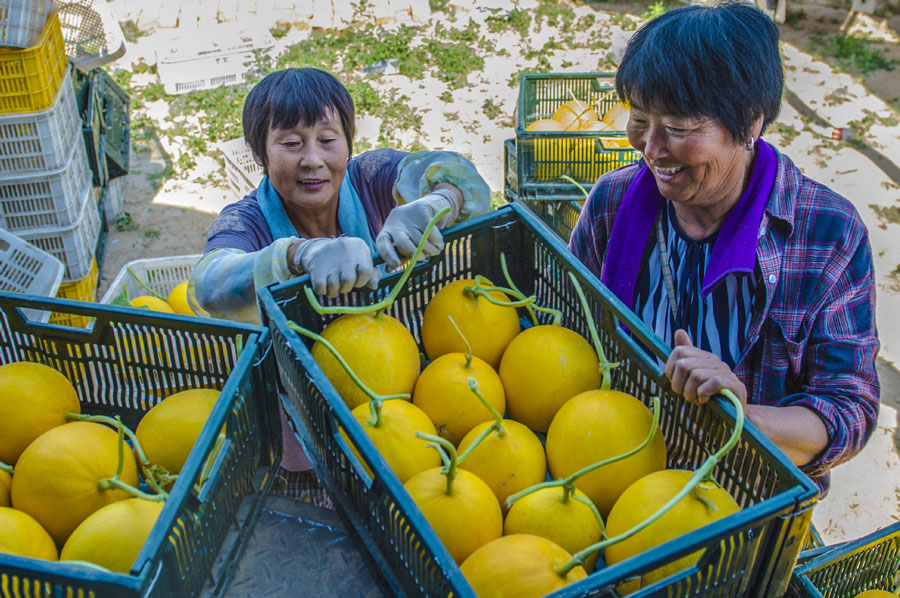Party members spearhead fight against poverty
China Daily,October 17, 2018 Adjust font size:
Farmers in Zaoqiang county, Hebei province, harvest melons. There are 200 hectares of melon fields in the county with an annual output of 10,000 metric tons, benefiting 2,000 rural households. [Photo/Xinhua]
Months of research
When Du began her work in Zhaizeping, she had no idea how to carry it out. As a painter, she had no experience of village work, but she learned from the poverty-relief training programs to talk with the villagers through door-to-door visits, asking for their opinions.
"I know I need to identify who is poor and for what reason, and then I figure out what I should do to help them," she said.
Following three months of research, Du identified 80 out of 311 households as being below the poverty line. As the village is in a mountainous area and just over 200 mu (13 hectares) of farmland is provided to more 700 people there, she said that developing agriculture might not be the best solution.
She set her sights on the nearby tourist site of Qikou, which is on the Yellow River and is an ancient trading town and home to many Shanxi merchants. Zhaizeping is only 10 minutes' walk from the town.
Du then came up with the idea of linking her targeted measures with the tourism business. "Now that we have tourists, we must do something to make money," she said.
The first things she thought of were handicrafts. Du designed a tiger's-head hat and encouraged villagers to make them as souvenirs. They also crafted donkeys, camels, pillows and other items and sold them to tourists.
Next, Du launched shadow puppet shows and taught more than 20 women how to perform. Each woman makes 1,500 yuan a month at the shadow puppet theater in Qikou.
She also helped villagers to improve irrigation facilities and to develop date-picking and vegetable-picking gardens as farm-stay tourist attractions.
Linking agricultural products and traditional handicrafts with the tourism business has proved to be a good approach suitable to Zhaizeping, Du said, adding that with tourists arriving, poor villagers' incomes have risen.
Like Du, more than 770,000 officials from the government, universities, State-owned enterprises and civil associations work in rural areas nationwide, including 195,000 first Party secretaries.
In recent decades, China has lifted more than 700 million people out of penury, accounting for an estimated 70 percent reduction in worldwide poverty. It was the first developing country to meet the UN Millennium Development Goals ahead of its target.
However, the previous "one-size-fits-all" poverty relief policy no longer works when it comes to the most-impoverished families. That is why Xi said targeted relief and customized policies are needed to help each poverty-stricken household.
His theory on targeted poverty alleviation evolved when he worked in Shaanxi, Hebei and Fujian provinces when he was younger and was developed further after the 18th CPC National Congress in November 2012 when he became general secretary of the CPC Central Committee.
When he was sent to Liangjiahe village in Northwest China's Shaanxi province as a zhiqing, or a young intellectual, between 1969 and 1975, Xi lived and worked with farmers. At that time, he was considering how to help villagers live better lives.
Later, when Xi worked as Party secretary of Ningde Prefecture in Fujian, East China, between 1990 and 1998, he became involved in the battle against poverty, as Ningde is one of the country's most impoverished areas.
In his book Up and Out of Poverty, published in 1992 and containing a series of articles and speeches Xi wrote when he was Party chief of Ningde, he argued that it is important to adhere to four principles in poverty-relief work. They are: shaking off any poverty mentality; adopting measures suitable to local conditions; showing strong leadership and coordination; and not investing in grandiose projects just because they are popular.
"We must eradicate the poverty that exists in our minds before we can eradicate it in the regions we govern, before we can help the people and nation out of poverty and embark on the road to prosperity," Xi wrote in the book.
When he arrived in Ningde in 1988, farmers' annual per capita income in the prefecture was 330 yuan. Last year, this had risen to 14,722 yuan.
Since Xi became general secretary of the CPC Central Committee, he has made poverty alleviation a leading task, put forward new ideas and drawn up new plans to reduce it.
During his 20-plus inspection tours nationwide since then, he has spent some time during each one to visit impoverished regions, talking and listening to poor people and taking action to reduce poverty.
Poverty alleviation efforts must be carried out with precision, with measures rolled out targeting different types of people and households, Xi said during his tour of Jiangxi province in February 2016. "Not a single family living in poverty is to be left behind," he said.

eefc7ccb-9b54-4008-95b6-26cb273d572a.jpeg)
